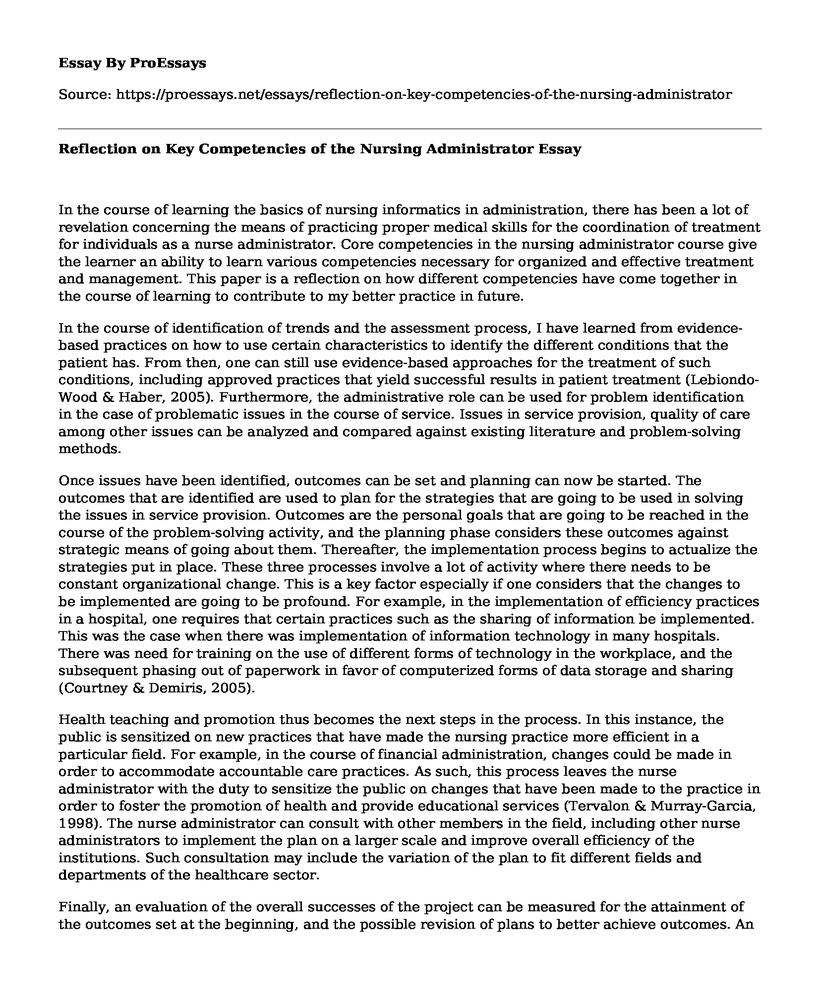In the course of learning the basics of nursing informatics in administration, there has been a lot of revelation concerning the means of practicing proper medical skills for the coordination of treatment for individuals as a nurse administrator. Core competencies in the nursing administrator course give the learner an ability to learn various competencies necessary for organized and effective treatment and management. This paper is a reflection on how different competencies have come together in the course of learning to contribute to my better practice in future.
In the course of identification of trends and the assessment process, I have learned from evidence-based practices on how to use certain characteristics to identify the different conditions that the patient has. From then, one can still use evidence-based approaches for the treatment of such conditions, including approved practices that yield successful results in patient treatment (Lebiondo-Wood & Haber, 2005). Furthermore, the administrative role can be used for problem identification in the case of problematic issues in the course of service. Issues in service provision, quality of care among other issues can be analyzed and compared against existing literature and problem-solving methods.
Once issues have been identified, outcomes can be set and planning can now be started. The outcomes that are identified are used to plan for the strategies that are going to be used in solving the issues in service provision. Outcomes are the personal goals that are going to be reached in the course of the problem-solving activity, and the planning phase considers these outcomes against strategic means of going about them. Thereafter, the implementation process begins to actualize the strategies put in place. These three processes involve a lot of activity where there needs to be constant organizational change. This is a key factor especially if one considers that the changes to be implemented are going to be profound. For example, in the implementation of efficiency practices in a hospital, one requires that certain practices such as the sharing of information be implemented. This was the case when there was implementation of information technology in many hospitals. There was need for training on the use of different forms of technology in the workplace, and the subsequent phasing out of paperwork in favor of computerized forms of data storage and sharing (Courtney & Demiris, 2005).
Health teaching and promotion thus becomes the next steps in the process. In this instance, the public is sensitized on new practices that have made the nursing practice more efficient in a particular field. For example, in the course of financial administration, changes could be made in order to accommodate accountable care practices. As such, this process leaves the nurse administrator with the duty to sensitize the public on changes that have been made to the practice in order to foster the promotion of health and provide educational services (Tervalon & Murray-Garcia, 1998). The nurse administrator can consult with other members in the field, including other nurse administrators to implement the plan on a larger scale and improve overall efficiency of the institutions. Such consultation may include the variation of the plan to fit different fields and departments of the healthcare sector.
Finally, an evaluation of the overall successes of the project can be measured for the attainment of the outcomes set at the beginning, and the possible revision of plans to better achieve outcomes. An inventory of the achievements met is done, and plans towards the ones yet to be achieved can be made. In conclusion, the course has taught me the administrative parts of the nursing practice that are a necessary part of the managerial nursing.
References
BIBLIOGRAPHY Courtney, K., & Demiris, G. (2005). Information Technology: changing nursing processes at the point-of-care . Nursing Adminstration.
Lebiondo-Wood, G., & Haber, J. (2005). Nursing Research: methods and critical appraisal for evidence-based practice. Nursing Research.
Tervalon, M., & Murray-Garcia, J. (1998). Cultural Humility Versus Cultural Competence: a critical distinction in defining physician training outcomes in multicultural education. Journal of Health Care for the Poor and Undeserved.
Cite this page
Reflection on Key Competencies of the Nursing Administrator. (2021, Mar 06). Retrieved from https://proessays.net/essays/reflection-on-key-competencies-of-the-nursing-administrator
If you are the original author of this essay and no longer wish to have it published on the ProEssays website, please click below to request its removal:
- The Kaplan-Meier Method
- Critical Thinking Example: Chapter 3 Reading Log
- Brain Disease and Football - Research Paper Example
- Iron Deficiency Anemia and Folate Deficiency Anemia Essay
- Nutritional Requirements During Pregnancy: Understanding Health Risks - Essay Sample
- COVID-19: Containing the Pandemic to Address Economic & Humanitarian Crisis - Free Paper
- Research Paper Sample on Bloodstream Infections







